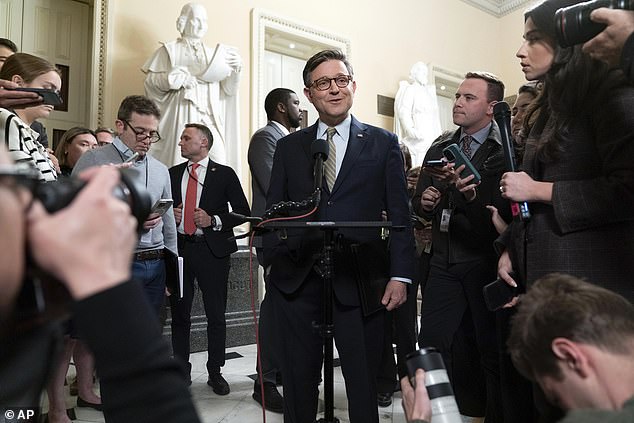Outgoing Treasury Secretary Janet Yellen has issued a stark warning to Congress about the United States’ fiscal future.
In a letter to Republican House Speaker Mike Johnson, Yellen claimed Friday that the federal government will reach its debt limit as soon as next month unless Congress takes action.
Otherwise, she said, the Treasury Department would have to take “extraordinary measures” to prevent the US from defaulting on its debt.
Such measures could include suspending certain types of investments in savings plans for government workers and health plans for retired postal workers, which would be restored once the debt ceiling is raised or abolished.
“The Treasury Department currently expects to reach the new limit between January 14 and January 23, at which time the Department will be required to take extraordinary measures,” Yellen wrote. according to NBC News.
“I respectfully request that Congress take action to protect the full confidence and credit of the United States.”
Once the US reaches the debt ceiling, the government will no longer be able to borrow money and will default, leaving it unable to pay its bills unless the president and Congress negotiate a way to lift the limit on its ability to borrow lift.
The debt ceiling was previously suspended in June 2023 following contentious negotiations over federal spending, work requirements for receiving government benefits, and the funding of the Internal Revenue Service.
But the suspension will now expire on January 2 – and when it is reinstated, the national debt would automatically increase by the amount of debt incurred since the suspension.
Outgoing Treasury Secretary Janet Yellen claimed the federal government will reach its debt limit as early as next month unless Congress takes action

She sent a letter to Republican House Speaker Mike Johnson saying the Treasury Department expects to reach the debt limit by mid-January
Yellen now says the federal government has just a few weeks to pass legislation to raise the debt ceiling before the Treasury Department would have to implement the “extraordinary measures.”
Congress would then have several months to pass legislation to raise the debt ceiling. according to the Wall Street Journal.
But this isn’t the first time Yellen has raised concerns about the debt ceiling.
In 2021, she called the debt limit “destructive” as she argued it should be abolished. reports the New York Times.
President-elect Donald Trump has also spoken out in favor of abolishing the debt limit – which is typically a Democratic proposal.
“The Democrats have said they want to get rid of it,” Trump told NBC News. “If they want to get rid of it, I’d take charge.”
He also said last week that the “debt ceiling guillotine” must be extended or ended before he takes office as the national debt exceeds $36 trillion.
Trump then tried to pass a provision that would raise or eliminate the spending law’s debt ceiling at the end of the year, before taking office and trying to implement a new round of tax cuts and spending priorities.

President-elect Donald Trump has spoken out in favor of abolishing the debt limit – which is typically a Democratic proposal

The debt ceiling was previously suspended in June 2023 following contentious negotiations over federal spending, work requirements for receiving government benefits, and the funding of the Internal Revenue Service
Trump demanded that Congress include provisions to extend or eliminate the debt ceiling in the bill, threatening electoral primaries against Republicans who voted to fund the government while excluding the debt limit.
Ultimately, 170 Republicans defied him, preventing the measure from moving forward.
But now Johnson, a Republican from Louisiana, faces a tough time getting the debt ceiling raised or abolished, as the GOP has only a slim majority in the House of Representatives.
Republicans have historically cited the debt ceiling during negotiations with Democrats, claiming federal spending is too high and have argued against eliminating or increasing it.

Yellen now says the federal government has just a few weeks to pass legislation to raise the debt ceiling before the Treasury Department would have to implement the “extraordinary measures.”
House Republicans have now discussed raising the debt limit in a party-line bill as part of their efforts to strengthen border enforcement and expand tax cuts.
This would not authorize any new spending, but would allow the Treasury Department to issue new debt to cover spending that Congress has already approved.
But raising the debt ceiling without any support from Democrats would mean that only a few Republican renegades could afford it.


